As Russian troops fought their way closer to Berlin, Adolf Hitler lived out the final days of the Third Reich within the Führerbunker. This massive two-level bunker complex was constructed some 22 feet below the Reich Chancellery. Some of the most senior Nazi political and military staff, with their SS guards and other administrative personnel, shared this space with their doomed leader.
April 1945 by Hermann Göring's bid to usurp him, and by Himmler's attempt to negotiate with the Allies. Already Adolf Hitler had declared that Nazi Germany had proved itself unworthy of his genius, and therefore deserved defeat in its historic struggle.
In the twilight world of the bunker, gloomy fatalism prevailed. Its occupants indulged in alcohol and casual sex, knowing that each day might be their last. Above ground in Berlin, the madness persisted, as the SS continued executing deserters and any who counseled surrender.
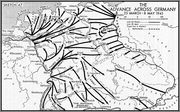
A few days before, on 27 April 1945, shortly after the Soviet occupation of the Berlin Tempelhof Airport, General Vasily Chuikov had moved his field headquarters from Johannisthal Airfield in south-eastern Berlin to Schulenburgring 2 in Tempelhof. Instead of the airport building he chose a traditional Berlin apartment building which he used until 4 May 1945. In the ground floor apartment of a certain Mrs. Anni Goebels, Weidling signed the order of surrender to all soldiers of the Berlin garrison. This signature meant the end of the Second World War for Berlin. Six days later, the unconditional surrender of the entire German forces was signed in nearby Berlin’s Karlshorst district.
26 April 1945 Germany
Accompanied by Hanna Reitsch, Field Marshal Greim, new Luftwaffe CinC, flies a Fieseler Storch into Berlin to confer with Hitler. With the Storch hit by AA fire over Berlin and Greim wounded, Hanna Reitsch safely crash-lands the aircraft on a street near the Brandenburg Gate
Hitler's private train is demolished to keep it out of Allied hands
According to a statement issued by Downing Street, the commanders of a United States division and of a Russian Guards division met at Torgau, south of Berlin on 26 April at 1600 hours local time.
Here we met the Russians who had advanced from the East. This was the first meeting of the Allied Forces. In fact the first contact was made between patrols on 25 April when a first lieutenant and three men of an intelligence and reconnaissance platoon of the US division met forward elements of the Russian Guards division. First Lieutenant Albert Kotzebue of the 3rd Battalion, 273rd Infantry, 69th Infantry Division took his men in a boat across the Elbe to be greeted by Lt Col Alexander Gardiev, Commander of the 175th Rifle Regiment of the 58th Guards Division, 34th Corps.
By 27 April, Berlin was cut off from the rest of Germany. Secure radio communications with defending units had been lost; the command staff in the bunker had to depend on telephone lines for passing instructions and orders and on public radio for news and information.
27 Apr 1945 The western Allies refused to consider Himmler's attempts at negotiation for peace.
27 April 1945 Hitler learns of Himmler's betrayal. Orders arrest of Himmler and Kammler.
27 April 1945 Austria
In Vienna, provisional government of Austria headed by Karl Renner asserts its independence from Germany
27 April 1945 Switzerland
Dulles ordered to immediately resume surrender negotiations with SS General Wolff
28 April 1945 Germany
Eva Braun's brother-in-law, SS Gruppenfuehrer Hermann Fegelein, executed outside Hitler's bunker for cowardice and treachery
United Kingdom
BBC announces that Himmler has offered to surrender Germany to the western Allies, but the offer has been refused
Italy
Mussolini and his mistress, Clara Petacci, attempt to flee to Switzerland
Mussolini, Clara Petacci, and twelve Fascist leaders captured and executed by partisans at Giulino di Mezzenegra near Lake Dongo
Bodies of Mussolini and Clara Petacci hung upside down on display in Milan
29 April 1945 Germany
Hitler marries Eva Braun in his bunker in Berlin with Goebbels and Bormann as witnesses. Hitler dictates his final testament to his secretary, Traudl Junge
Hitler orders German forces to continue fighting in the so-called Alpine Fortress
Hitler expels Goering and Himmler from the Nazi party
Hitler names Doenitz his successor as leader of Germany
Hitler names Hanke leader of the SS, Goebbels Reich Chancellor, Bormann party minister, Seyss-Inquart Foreign Minister, and Field Marshal Schorner Army CinC
Hitler learns of the death of Mussolini and display of bodies in Milan
Hitler orders Blondi, his Alsatian dog, killed in order to test effectiveness of poison capsules
In an Arado 96 aircraft which takes off from a street, Hanna Reitsch and Luftwaffe CinC Field Marshal Greim, each carrying a cyanide capsule presented by Hitler, flown out of Berlin with orders from the Fuehrer to arrest Himmler
Italy
In Caserta, German representatives sign surrender of German forces in Italy, to become effective 2 May
30 April 1945 Germany
Eva Braun and Adolf Hitler commits suicide in the bunker in Berlin.
Bodies of Hitler and Eva Braun soaked in gasoline and burned outside the bunker
Bormann notifies Doenitz of his appointment as Hitler's successor, but neglects to tell him the Fuehrer is dead
Overnight, in agreement with Goebbels and Bormann, General Krebs makes his way to Zhukov's HQ with a letter for Stalin offering a German-Soviet armistice
Netherlands
Reichskommissar Seyss-Inquart confers with General Walter Bedell Smith and other Allied officers near Apeldoorn about food supplies and possible surrender of German forces in western Netherlands
4 May 1945 German forces in Denmark, the Netherlands, and northwestern Germany surrendered to British Field Marshal Bernard Montgomery, to be in effect at 0800 hours on the next day. Meanwhile, in Germany, US Ninth Army accepted surrender of German Ninth and Twelfth Armies and US Third Army accepted the surrender by Feldmarschall Paul von Kleist.
5 May 1945 German General Blaskowitz surrendered all German forces in the Netherlands at the Hotel de Wereld in Wageningen to Canadian General Charles Foulkes. In Denmark, the German occupation forces surrendered. In Italy, German Armeegruppe C surrendered.
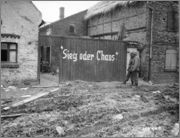
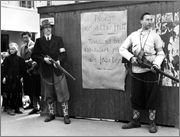
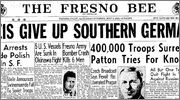
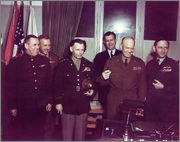
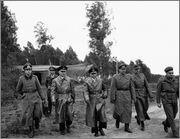
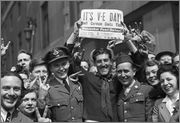
Germany's Surrender 7 May 1945
7 May 1945 General Jodl signed the unconditional surrender of all German forces to the Allies, to take effect on the following day, at Eisenhower's headquarters near Rheims, France; the Soviets witnessed the surrender at Rheims, but did not recognise the surrender until another document was signed in the Soviet-conquered territory. On the same day, German occupation forces in Norway surrendered.
[You must be registered and logged in to see this link.]
Eisenhower sent the following message to his troops upon the German surrender:
The route you have traveled through hundreds of miles is marked by the graves of former comrades. Each of the fallen died as a member of the team to which you belong, bound together by a common love of liberty and a refusal to submit to enslavement. Our common problems of the immediate and distant future can be best solved in the same conceptions of co-operation and devotion to the cause of human freedom as have made this Expeditionary Force such a mighty engine of righteous destruction.
Let us have no part in the profitless quarrels in which other men will inevitably engage as to what country, what service, won the European war. Every man, every woman, of every nation here represented has served to the outcome. This we shall remember-and in doing so we shall be revering each honored grave, and be sending comfort to the loved ones of comrades who could not live to see this day.
The British Prime Minister, Winston Churchill, said:
"We meet in true and victorious comradeship and with inflexible resolve to fulfil our purpose and our duty. Let all march forward upon the foe."
Marshal Joseph Stalin spoke of the war still ahead:
"Our task and our duty are to complete the destruction of the enemy to force him to lay down his arms and surrender unconditionally.The Red Army will fulfil to the end this task and this duty to our people and to all freedom-loving peoples."
President Harry S Truman welcomed the news:
"This is not the hour of final victory in Europe, but the hour draws near, the hour for which all the American people, all the British people and all the Soviet people have toiled and prayed so long."
Joseph Stalin, the leader of the Soviet Union, was unhappy to see the surrender ceremony taken place outside of the area conquered by Soviet forces, thus demanded, and got, a separate surrender ceremony in Berlin.
This took place on the following day, 9 May, with British Air Chief Marshal Arthur Tedder representing the western Allies. Zhukov was very much the star of this separate ceremony, and made every effort to behave as a proud conqueror.
When Keitel signed the document, removed his monocle, and began to make a formal speech marking the occasion, Zhukov interrupted Keitel, announcing that all Soviet representatives at the ceremony were free to go as the document had already been made official.
April 1945 by Hermann Göring's bid to usurp him, and by Himmler's attempt to negotiate with the Allies. Already Adolf Hitler had declared that Nazi Germany had proved itself unworthy of his genius, and therefore deserved defeat in its historic struggle.
In the twilight world of the bunker, gloomy fatalism prevailed. Its occupants indulged in alcohol and casual sex, knowing that each day might be their last. Above ground in Berlin, the madness persisted, as the SS continued executing deserters and any who counseled surrender.

A few days before, on 27 April 1945, shortly after the Soviet occupation of the Berlin Tempelhof Airport, General Vasily Chuikov had moved his field headquarters from Johannisthal Airfield in south-eastern Berlin to Schulenburgring 2 in Tempelhof. Instead of the airport building he chose a traditional Berlin apartment building which he used until 4 May 1945. In the ground floor apartment of a certain Mrs. Anni Goebels, Weidling signed the order of surrender to all soldiers of the Berlin garrison. This signature meant the end of the Second World War for Berlin. Six days later, the unconditional surrender of the entire German forces was signed in nearby Berlin’s Karlshorst district.
26 April 1945 Germany
Accompanied by Hanna Reitsch, Field Marshal Greim, new Luftwaffe CinC, flies a Fieseler Storch into Berlin to confer with Hitler. With the Storch hit by AA fire over Berlin and Greim wounded, Hanna Reitsch safely crash-lands the aircraft on a street near the Brandenburg Gate
Hitler's private train is demolished to keep it out of Allied hands
According to a statement issued by Downing Street, the commanders of a United States division and of a Russian Guards division met at Torgau, south of Berlin on 26 April at 1600 hours local time.
Here we met the Russians who had advanced from the East. This was the first meeting of the Allied Forces. In fact the first contact was made between patrols on 25 April when a first lieutenant and three men of an intelligence and reconnaissance platoon of the US division met forward elements of the Russian Guards division. First Lieutenant Albert Kotzebue of the 3rd Battalion, 273rd Infantry, 69th Infantry Division took his men in a boat across the Elbe to be greeted by Lt Col Alexander Gardiev, Commander of the 175th Rifle Regiment of the 58th Guards Division, 34th Corps.
By 27 April, Berlin was cut off from the rest of Germany. Secure radio communications with defending units had been lost; the command staff in the bunker had to depend on telephone lines for passing instructions and orders and on public radio for news and information.
27 Apr 1945 The western Allies refused to consider Himmler's attempts at negotiation for peace.
27 April 1945 Hitler learns of Himmler's betrayal. Orders arrest of Himmler and Kammler.
27 April 1945 Austria
In Vienna, provisional government of Austria headed by Karl Renner asserts its independence from Germany
27 April 1945 Switzerland
Dulles ordered to immediately resume surrender negotiations with SS General Wolff
28 April 1945 Germany
Eva Braun's brother-in-law, SS Gruppenfuehrer Hermann Fegelein, executed outside Hitler's bunker for cowardice and treachery
United Kingdom
BBC announces that Himmler has offered to surrender Germany to the western Allies, but the offer has been refused
Italy
Mussolini and his mistress, Clara Petacci, attempt to flee to Switzerland
Mussolini, Clara Petacci, and twelve Fascist leaders captured and executed by partisans at Giulino di Mezzenegra near Lake Dongo
Bodies of Mussolini and Clara Petacci hung upside down on display in Milan
29 April 1945 Germany
Hitler marries Eva Braun in his bunker in Berlin with Goebbels and Bormann as witnesses. Hitler dictates his final testament to his secretary, Traudl Junge
Hitler orders German forces to continue fighting in the so-called Alpine Fortress
Hitler expels Goering and Himmler from the Nazi party
Hitler names Doenitz his successor as leader of Germany
Hitler names Hanke leader of the SS, Goebbels Reich Chancellor, Bormann party minister, Seyss-Inquart Foreign Minister, and Field Marshal Schorner Army CinC
Hitler learns of the death of Mussolini and display of bodies in Milan
Hitler orders Blondi, his Alsatian dog, killed in order to test effectiveness of poison capsules
In an Arado 96 aircraft which takes off from a street, Hanna Reitsch and Luftwaffe CinC Field Marshal Greim, each carrying a cyanide capsule presented by Hitler, flown out of Berlin with orders from the Fuehrer to arrest Himmler
Italy
In Caserta, German representatives sign surrender of German forces in Italy, to become effective 2 May
30 April 1945 Germany
Eva Braun and Adolf Hitler commits suicide in the bunker in Berlin.
Bodies of Hitler and Eva Braun soaked in gasoline and burned outside the bunker
Bormann notifies Doenitz of his appointment as Hitler's successor, but neglects to tell him the Fuehrer is dead
Overnight, in agreement with Goebbels and Bormann, General Krebs makes his way to Zhukov's HQ with a letter for Stalin offering a German-Soviet armistice
Netherlands
Reichskommissar Seyss-Inquart confers with General Walter Bedell Smith and other Allied officers near Apeldoorn about food supplies and possible surrender of German forces in western Netherlands
4 May 1945 German forces in Denmark, the Netherlands, and northwestern Germany surrendered to British Field Marshal Bernard Montgomery, to be in effect at 0800 hours on the next day. Meanwhile, in Germany, US Ninth Army accepted surrender of German Ninth and Twelfth Armies and US Third Army accepted the surrender by Feldmarschall Paul von Kleist.
5 May 1945 German General Blaskowitz surrendered all German forces in the Netherlands at the Hotel de Wereld in Wageningen to Canadian General Charles Foulkes. In Denmark, the German occupation forces surrendered. In Italy, German Armeegruppe C surrendered.






Germany's Surrender 7 May 1945
7 May 1945 General Jodl signed the unconditional surrender of all German forces to the Allies, to take effect on the following day, at Eisenhower's headquarters near Rheims, France; the Soviets witnessed the surrender at Rheims, but did not recognise the surrender until another document was signed in the Soviet-conquered territory. On the same day, German occupation forces in Norway surrendered.
[You must be registered and logged in to see this link.]
Eisenhower sent the following message to his troops upon the German surrender:
The route you have traveled through hundreds of miles is marked by the graves of former comrades. Each of the fallen died as a member of the team to which you belong, bound together by a common love of liberty and a refusal to submit to enslavement. Our common problems of the immediate and distant future can be best solved in the same conceptions of co-operation and devotion to the cause of human freedom as have made this Expeditionary Force such a mighty engine of righteous destruction.
Let us have no part in the profitless quarrels in which other men will inevitably engage as to what country, what service, won the European war. Every man, every woman, of every nation here represented has served to the outcome. This we shall remember-and in doing so we shall be revering each honored grave, and be sending comfort to the loved ones of comrades who could not live to see this day.
The British Prime Minister, Winston Churchill, said:
"We meet in true and victorious comradeship and with inflexible resolve to fulfil our purpose and our duty. Let all march forward upon the foe."
Marshal Joseph Stalin spoke of the war still ahead:
"Our task and our duty are to complete the destruction of the enemy to force him to lay down his arms and surrender unconditionally.The Red Army will fulfil to the end this task and this duty to our people and to all freedom-loving peoples."
President Harry S Truman welcomed the news:
"This is not the hour of final victory in Europe, but the hour draws near, the hour for which all the American people, all the British people and all the Soviet people have toiled and prayed so long."
Joseph Stalin, the leader of the Soviet Union, was unhappy to see the surrender ceremony taken place outside of the area conquered by Soviet forces, thus demanded, and got, a separate surrender ceremony in Berlin.
This took place on the following day, 9 May, with British Air Chief Marshal Arthur Tedder representing the western Allies. Zhukov was very much the star of this separate ceremony, and made every effort to behave as a proud conqueror.
When Keitel signed the document, removed his monocle, and began to make a formal speech marking the occasion, Zhukov interrupted Keitel, announcing that all Soviet representatives at the ceremony were free to go as the document had already been made official.








